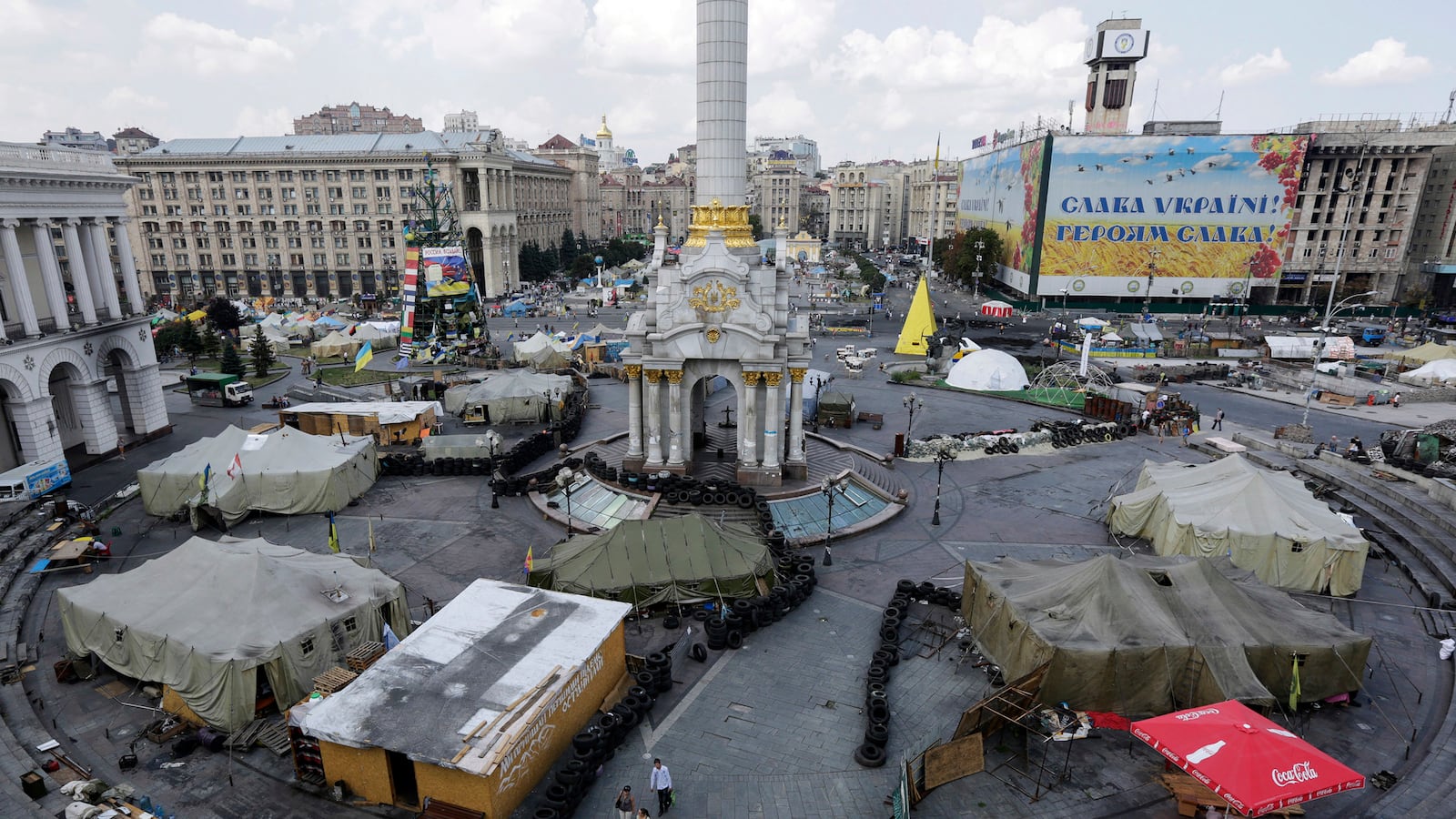KIEV, Ukraine — The symbol of the Ukrainian revolution, the Maidan Square, is seething with bitterness and aggression these days. Rough-looking “campers,” some of whom joined the occupy movement in central Kiev last November that brought down the pro-Russian government in February, sat around a wooden table railing at the new politicians that have replaced the old. Several of the campers are wounded and bandaged after clashes with police on Wednesday and Thursday. “Klitschko is a traitor,” they mutter.
Earlier on Friday morning, the heavyweight boxing champion who’s now the mayor of the Ukrainian capital, Vitaly Klitschko, had walked into the crowd of angry protestors. As tall as the Russian Tsar Peter the Great, the 6-foot-8 former prizefighter, a star of the revolution earlier this year, literally towered above the campers in his immaculate white shirt and dark blue jacket, making them look even more poor and miserable than usual. “Who are these barricades against?” he demanded. Nobody answered. Officials promised to come back and clear out the Maidan on Saturday.
The campers do not doubt that is just what the cops will try to do. So they have built new barricades out of bricks torn up from the square’s pavement. They have Molotov cocktails ready for action. These men and women determined to hold their ground call themselves “veterans of the Revolution of Dignity,” as the Maidan protest movement is called. But many are homeless, have always lived on the margins of society, and seem to have made the occupation of the Maidan and the battles to stay there a way of life as much as social and political cause.
At a time when there are constant news reports about the hate, pain and death in the ongoing war in eastern part of the country that is partly Russia’s answer to the Maidan movement, many Ukrainians think new violence in the heart of Kiev is self-destructive. But many of the campers won’t leave because, it seems, they have no place to go.
Mikhail, a camper in a spotted shirt with baggie, swollen eyelids, complained that by sending police to push dozens of tents off the square, Klitschko “spat at the face of the Revolution of Dignity.” One of the Maidan “defenders” at the table, a stout 30-year-old woman in a striped sailor shirt named Irina Gotun, had her right hand bandaged after being wounded in Thursday’s clashes with police. Gotun insisted that two people died and 30 were injured in those street battles. But at the Ukraine Crisis Media Center, Valentin Pugachev told the The Daily Beast that the information about casualties was “made up.”
Most residents of Kiev are tired of the black smoke from burning tires on the capital’s main square, of weekly rallies and clashes with riot police.
One of the key ideologues and inspirations behind the original revolutionary movement, a leading journalist and social activist, Mustafa Nayyem, reminded his compatriots Friday about the core ideas behind the Maidan revolution, which began as a bid to bring Ukraine closer to Europe. The exemplification of the Maidan ideals should be “reforms, victory in the east, support for our guys on the front lines – never a bunch of drunk and aggressive unemployed people, stuck in tents in the center of the capital,” Nayyem wrote on Facebook.
But Gotun, who says she spent her childhood with abusive teachers in an orphanage, thinks Nayyem has gone to the wrong side of the barricades. A dusty tent and a wobbly wooden fence under the black statue with golden wings of Archangel Mikhail has been Irina’s her home and her raison d’être since last December. “If they try to touch us again, we will have our friends from Aidar battalion pull back to Kiev from the front lines and burn the parliament,” she vowed.
That sort of threat may be made up, too. But as soldiers are fighting and dying to protect the values of the Revolution of Dignity against Russian-backed separatists, it would seem appropriate for Ukrainian authorities to find a dignified way to move the campers to shelters or find them find respectable jobs.






